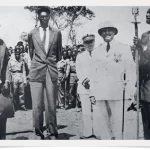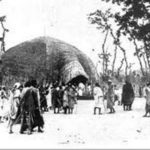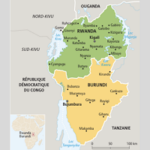The Socio-Economic Complex
In the previous chapter we have analysed the political system in Rwanda. The king clearly occupied a centralposition in the political structure. For the maintenance of his court and his army, for the execution of his orders and for support against potential rival groups he depended on the chiefs whom he had appointed and who were not necessarily bound to him by ties of close kinship. Moreover we have seen that there was intense competition for the various offices contained in the political system. The clientage system in Rwanda was closely related to this competition for political office. This has been described by lemarehand (1966 p,3ll) mainly in terms of the protection secured by the client in exchange for economic goods and services rendered to the patron. Dr Mair (I961) has analysed clientage relations in East Africa in broader terms of the mutual advantages gained byboth, although unequal, partners in the relationship. Dr. Mair’s analysis is in the context of the development of political systems. while we shall not be considering this developmental aspect of clientage relations we propose to analyse the clientage system in Rwanda in these broader terms of mutual advantage and to further determine the nature of these advantages within the wider context of the political and economic systems.
The clientage structure in Rwanda is called ubuhake. Ubuhake denoted “the relationship between a person called garagu (client) and another called shebuja (patron). That relationship was created when an individual, Hutu or Tutsi, who had an inferior social status and who was less provided with cattle, offered his services to and asked protection from a person of higher status and whose wealth in cattle was greater”.
“The ubuhake relation could be ended when both client and patron or only one of them wanted this”.
Gravel describes the ubuhake system as “the institution through which an individual, be he peasant or herder, commended himself to a lord. The lord gave protection and support; he also gave the vassal rights to exploit a certain amount of land and he gave him a cow or cows. The vassal on the other hand, swore fealty and recognised unto himself duties of homage, payments in duties and kind, labour and service in general,” (1968 p.24)
Gravel disagrees with “European scholars of Rwanda who have generally seen the cow as the sole benefice and completely distinct from land tenure…… The benefice, land, was the measure of service and the cow recorded the grant of benefice” (p.82)
However both descriptions imply the common factors of a personal relationship, an exchange of economic’goods and mutual support. On the other hand, Maquet and d’Hertefelt call chiefs of the administrative and army structures clients of the king, “Les grands chefsétaient les garagu du monarque”. Others go still further: « Lorsque un chef était établi sur une colline, tous ses sujets devenaient par le fait même ses clients ».
Against this background of what has been said of the political structure it is clear that the word client, as used by the different authors or by the same author in different contexts, applies to different relationships and is therefore ambiguous. Maquet has designated as feudal all the relationships expressed in the ubuhake. L. de Heusch has taken exception to this: “les autorités-politiques sont les représentants du roi avant d’être ses clients”.We have to consider the institution of ubuhake in Rwanda in the wider context both of the political system and of the economic complex. In the followingchapter we propose to deal with (1) Rights in land, (2) Rights in cattle, (3) ubuhake, (4) the clientage structure and its development.
https://uk.amateka.net/the-socio-economic-complex/https://uk.amateka.net/wp-content/uploads/2019/10/missionnaires.jpghttps://uk.amateka.net/wp-content/uploads/2019/10/missionnaires-150x150.jpgSocial & cultureIn the previous chapter we have analysed the political system in Rwanda. The king clearly occupied a centralposition in the political structure. For the maintenance of his court and his army, for the execution of his orders and for support against potential rival groups he depended on the chiefs...BarataBarata rpierre@ikaze.netAdministratorAMATEKA | HISTORY OF RWANDA



